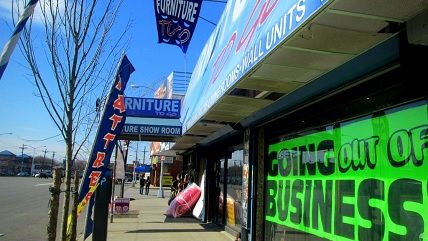The Key to Deterring Migrants Is to Blow Up the Economy
Anti-immigration politicians vilify foreigners who already left.

Several years ago our housecleaner gave us notice. She'd landed a well-paying job at the Mexico City airport that was a hell of a lot more enticing than scrubbing gringos' bathrooms. Angela and her family had come to the United Stated for economic opportunity, but her country now had more to offer and she was happy to return home.
Angela wasn't alone; in recent years, more immigrants have been returning to Mexico than have entered the United States. If Donald Trump ever gets his chance to build a giant wall along the border, it may only serve to keep people in. That's assuming the wall is effective at all, of course. Research suggests that governments have a lot less control over cross-border movements than politicians claim. Policymakers can make life less pleasant for migrants, but pursuit of opportunity matters much more than laws and even the yoojest barrier along a dotted line—going where the jobs are is one of the more effective ways of alleviating poverty, after all. So, if you want to keep migrants from flocking toward prosperity, blow up that prosperity—which the United States did a good job of around 2008.
"From 2009 to 2014, 1 million Mexicans and their families (including U.S.-born children) left the U.S. for Mexico," reports the Pew Research Center. During the same period, "an estimated 870,000 Mexican nationals left Mexico to come to the U.S." That represents a net outflow of roughly 140,000 people.
Pew speculates that border security efforts have played a role, but such policies have ebbed and flowed over the years, independent of immigration numbers. More telling is that the reverse in the flow came as the Great Recession whacked the American economy. "The slow recovery of the U.S. economy after the Great Recession may have made the U.S. less attractive to potential Mexican migrants and may have pushed out some Mexican immigrants as the U.S. job market deteriorated," notes Pew. Polling now finds that Mexicans no longer necessarily see opportunity as being better north of the border: "a third (33 percent) of adults in Mexico say those who move to the U.S. lead a life that is equivalent to that in Mexico—a share 10 percentage points higher than in 2007."
At the same time, the apprehension of non-Mexican illegal immigrants at the border has increased and outnumbered Mexicans as of 2014 by 257,473 to 229,178. Presumably, even the hobbled U.S. job market looks better than life at home for the new stream of migrants who remain undeterred by arrests, deportations, and a hostility toward foreign workers that bridges the ideological divide, such as it is, between presidential contenders Trump and Bernie Sanders.
That economic forces count more than policy when it comes to spurring or discouraging migration is something that government officials may not like to discuss, but which researchers continuously find. "With no legal constraints to population mobility, workers/households will move—at least in part— in response to economic opportunities," former World Bank economist Lant Pritchett wrote in 2004. He illustrated his point with the example of Ireland, from which a huge proportion of the population fled in the wake of the potato famine.
Immigration is a powerful and effective means for escaping poverty, Pritchett told Reason in 2008. And the biggest barrier to improved prosperity is "men with guns."
But men with guns, it turns out, have limited power. "Restrictive immigration control policies create a profitable niche for those exploiting the black market of international migration," Eiko R. Thielemann of the London School of Economics pointed out after examining migration patterns in OECD countries. Migrants move primarily based on employment opportunities, existing networks, and perceptions about the overall attractiveness of the places they go, so that "asylum destination choice is affected above all by 'structural' factors that, at least in the short and medium term, are beyond the reach of asylum policy makers."
Ultimately, mass deportations, employment restrictions, and border fences become minor obstructions around which immigrant smugglers can plan and from which they can turn a buck. Immigrants will continue to cross national boundaries so long as they find prospects on the other side to be more attractive than what they leave behind. And they'll stop coming only when those prospects evaporate and the grass on the other side of the fence stops being so comparatively green.
As we've seen, that grass turned crispy and brown about the time officials in D.C. bailed out their buddies in the financial and automotive industries. Many Americans complain that the economy has remained sluggish since, and it turns out that Mexicans agree. The key to deterring immigrants, nativists should note, is to make the place kind of suck. Unfortunately, that makes it lousy for everybody.
And actually improving the economy would improve prospects for the native-born and migrants alike.
But even with a net outflow of Mexicans nationals from the United States to Mexico, politicians continue to talk up fear of immigration and to tout restrictive policies. That's because mass deportations, employment restrictions, and border fences are at least as profitable for office-seekers as they are for migrant-smuggling coyotes.
Angela and other Mexicans, like people around the world, chase opportunities with little regard for the fear-mongering of political candidates. But for politicians, stirring the pot of unfounded concerns while their country becomes an unattractive destination is opportunity.


Show Comments (27)